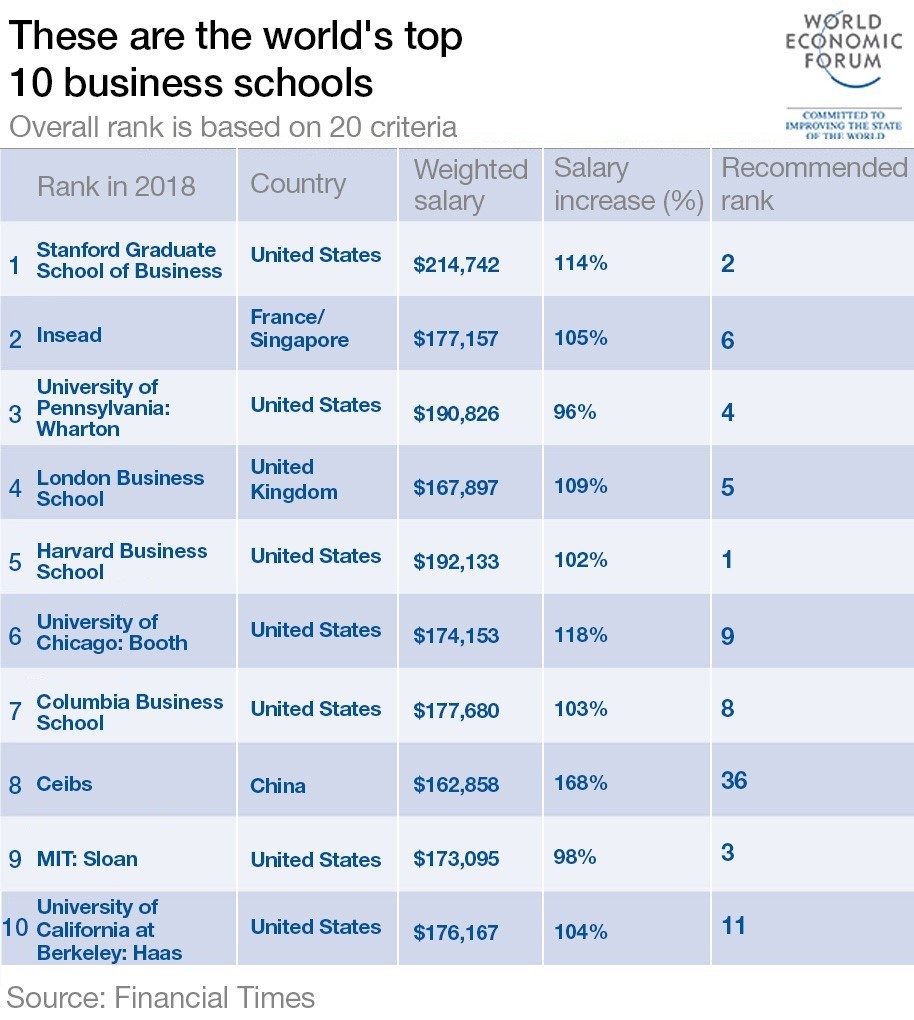These are the world's best business schools, according to the Financial Times

According to the Financial Times, these are the 100 best business schools for studying an MBA.
Image: REUTERS/Brian Snyder
Stay up to date:
United States
The Financial Times (FT) has released its annual guide to the 100 best business schools for studying an MBA.
The FT Global MBA Ranking 2018 is compiled using responses from alumni and data taken from each school, and includes 20 different ranking criteria, such as average salary three years after graduation, average salary increase, and the course’s perceived value for money.
The report also highlights the percentage of students that had found a job or accepted a job offer within three months of graduation, and features a handful of gender-related criteria, including the number of female students and staff members on each course.
US schools dominate
US business schools dominate the top 10, with Stanford Graduate School of Business being judged as having the world’s best MBA.
Stanford, which was ranked second last year, achieved high scores across several categories, including for its graduates earning the highest wages three years after graduation of any school surveyed.
Graduates from Stanford earn on average $214,742, which is an increase of 114% in comparison to their average salary before starting the course.
What’s more, 87% of the 95 students from ‘the class of 2014’ had found employment within three months of graduating.
However, Stanford didn’t score well across every category. It was ranked 70th in terms of value for money, which is calculated using salary earned today, course length, and fees, among other criteria.
Insead slips
Meanwhile, last year’s best school, Insead, is now second in the global rankings. The school, based in France and Singapore, was also ranked inside the top 10 in the ‘value for money’ category, and placed sixth in the ‘recommend’ category, where alumni were asked to choose three schools from which they would recruit graduates.
Harvard Business School, which was ranked fifth overall, was the most-recommended school in the 2018 rankings, while Stanford was second.
Insead graduates also earn on average $177,157, which is an increase of 105% compared to when the course started, though considerably lower than the pay of Stanford graduates.

Another US business school, the University of Pennsylvania: Wharton, was ranked third overall. It achieved a high conversion rate for those finding employment, with 93% of the 95 students accepting a job offer within three months of completing the course.
While its graduates received a slightly smaller salary increase (98%) than those at Stanford and Insead, Wharton graduates earned on average $190,826, and were in third position in the weighted salary category, after Stanford and Harvard.
The school also had a relatively even split of male (56%) and female (44%) students. However, Wharton was one of the worst-performing school in terms of value for money, ranking 98th.
Alongside Stanford, Insead and Wharton, the top 10 includes the London Business School in fourth overall, where the average salary has increased by 109% since the course began, and Harvard Business School, in fifth, where graduates earn on average $192,133.
Don't miss any update on this topic
Create a free account and access your personalized content collection with our latest publications and analyses.
License and Republishing
World Economic Forum articles may be republished in accordance with the Creative Commons Attribution-NonCommercial-NoDerivatives 4.0 International Public License, and in accordance with our Terms of Use.
The views expressed in this article are those of the author alone and not the World Economic Forum.
Related topics:
Forum Stories newsletter
Bringing you weekly curated insights and analysis on the global issues that matter.
More on Education and SkillsSee all
Morgan Camp
July 9, 2025
Shakthi M Nagappan
July 7, 2025
Stacy Greiner
July 1, 2025
Jean Daniel LaRock and Ashley Hemmy
June 23, 2025
Roberta Vicente Barreras
June 19, 2025
Steven Sim
June 10, 2025






